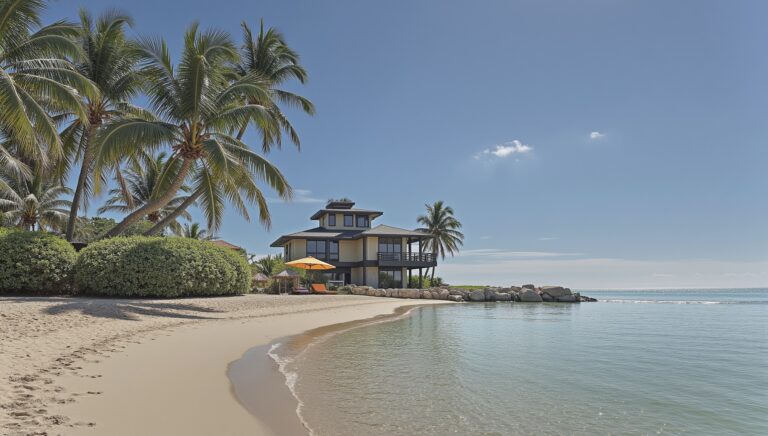Are you dreaming of owning a property but unsure how to navigate the financial landscape?
Bank loans for property are a common avenue to turn your dream into reality, but the process can seem daunting.
In this comprehensive guide, we’ll explore everything you need to know about securing a bank loan for your property, from understanding the types available to managing your loan responsibly.
Whether you’re a first-time homebuyer or looking to invest in your next property, this resource will equip you with essential insights to make informed decisions.

Key Takeaways
- Bank loans for property include various types such as mortgages and home equity loans.
- Eligibility for a property loan typically hinges on credit score, income, and debt-to-income ratio.
- The application process for property loans can be complex, requiring detailed documentation.
- Securing the best bank loan rates involves shopping around and improving your credit profile.
- Managing your property loan responsibly is crucial to avoid default and maintain financial health.
Understanding Bank Loans for Property
When venturing into the Costa Rica real estate market, many buyers consider securing financing through bank loans for property purchases.
Understanding how these loans work is crucial for both local and foreign investors.
Generally, Costa Rican banks offer a range of mortgage options, including fixed and variable interest rates, with terms typically spanning from 15 to 30 years.
To qualify for a bank loan for property, applicants must provide proof of income, credit history, and in some cases, a down payment of at least 20%.
While foreign buyers can also access financing, some banks may require a larger down payment or additional documentation due to perceived risks.
As you navigate this process, it’s essential to compare loan terms across different institutions and consider consulting a real estate professional who can offer insights tailored to your unique situation.
Types of Property Loans Offered by Banks
When considering purchasing real estate, understanding the types of bank loans property buyers can access is crucial.
Banks typically offer a variety of loan options tailored to meet the diverse needs of homebuyers and investors.
Among the most common types are fixed-rate mortgages, where the interest rate remains constant throughout the loan term, making budgeting predictable.
Alternatively, adjustable-rate mortgages (ARMs) start with a lower initial rate, which can fluctuate over time based on market conditions.
For those looking to invest in a rental property, banks provide specific investment property loans, which may come with higher interest rates often due to the perceived risk.
Additionally, many financial institutions offer government-backed loans, such as FHA or VA loans, which cater to first-time homebuyers or veterans, providing them with lower down payments and more favorable terms.
Understanding these options is essential for navigating the financial landscape of real estate in Costa Rica or any other market.
‘The best way to predict your future is to create it.’ – Peter Drucker

Eligibility Criteria for Bank Loans
When it comes to securing bank loans for property purchases, particularly in regions like Costa Rica, understanding the eligibility criteria is crucial for prospective buyers.
Banks typically look for several factors when determining whether to approve a loan.
These include credit history, income stability, and the amount of down payment.
A good credit score demonstrates reliability, while a consistent income can assure lenders of your ability to meet monthly repayments.
Additionally, many banks require a minimum down payment, which can range from 20% to 30% of the property’s value.
Potential borrowers should also consider the types of properties that qualify for bank loans, as certain developments or listed properties may have specific lending criteria.
By familiarizing yourself with these requirements, you can better prepare for a smooth application process and make your real estate investment in Costa Rica more achievable.
The Application Process for Property Loans
When considering the purchase of real estate in Costa Rica, understanding the application process for property loans is crucial.
Bank loans for property acquisition can be slightly different from traditional loans in other countries.
First, it’s important to gather all necessary documentation, such as proof of income, credit history, and details about the property.
Most banks will require a minimum down payment, typically ranging from 20% to 30% of the property’s total value.
Once your documentation is ready, you can approach various lenders to compare loan terms, interest rates, and repayment periods.
It’s advisable to work with a local real estate agent or mortgage broker who understands the intricacies of Costa Rican banking, as they can help facilitate the application process and guide you through selecting the best bank loans for your property needs.
Additionally, be prepared for a thorough appraisal and legal review of the property to ensure a smooth transaction.

Tips for Securing the Best Bank Loan Rates
When you’re venturing into the Costa Rica real estate market, understanding the nuances of financing is essential, particularly if you are considering using bank loans for property purchases.
Securing the best bank loan rates hinges on several factors.
First, always shop around; different lenders may offer varying rates and terms.
It’s also beneficial to maintain a strong credit score, as this can significantly influence the rates banks will offer you.
Furthermore, be prepared to provide a substantial down payment, typically around 20%, to strengthen your loan application.
Additionally, consider locking in your interest rates when they are low, as this can save you money over the lifespan of the loan.
Lastly, consult with a local real estate expert who can provide insights into the Costa Rican market and recommend reputable banks.
By following these tips, you can navigate the process of securing bank loans for property confidently and efficiently.
Managing Your Property Loan Responsibly
Managing your property loan responsibly is crucial for ensuring financial stability and long-term success in your investment, especially in a vibrant real estate market like Costa Rica.
When considering bank loans for property, it’s essential to understand the terms and conditions that come with them.
Start by conducting thorough research to compare interest rates and repayment periods from various banks, which can significantly impact your overall financial commitments.
Additionally, creating a realistic monthly budget that accounts for not only your loan repayments but also other expenses such as insurance, maintenance, and taxes will help you avoid any financial strain.
It’s also wise to maintain a good credit score, as this can lead to more favorable loan terms.
Finally, don’t hesitate to consult with a financial advisor or a real estate expert in Costa Rica who can provide personalized advice tailored to your specific situation, helping you make informed decisions about your property loan management.
Frequently Asked Questions
What types of property loans do banks typically offer?
Banks commonly offer several types of property loans including fixed-rate mortgages, adjustable-rate mortgages (ARMs), interest-only loans, and government-backed loans like FHA and VA loans.
Each type has its own terms and conditions suited for different financial situations.
What are the common eligibility criteria for obtaining a bank loan for property?
Typically, banks assess eligibility based on factors such as credit score, income stability, employment history, debt-to-income ratio, and the amount of down payment.
Each bank may have specific requirements, so it’s important to check with individual lenders.
What is the process for applying for a property loan at a bank?
The application process generally involves filling out a loan application, providing financial documentation (like income statements, tax returns, and credit information), undergoing a credit check, and possibly an appraisal of the property.
After evaluation, the bank will either approve or deny the loan.
How can I secure the best rates for a bank loan?
To secure the best rates, you can improve your credit score, compare rates from multiple lenders, consider a larger down payment, and shop for loans while your credit inquiry is minimized.
Also, looking for government programs or incentives can help lower your rates.
What does it mean to manage my property loan responsibly?
Managing your property loan responsibly means making timely payments, keeping your debt-to-income ratio in check, regularly reviewing your financial situation, and staying informed about your loan terms.
By doing so, you’ll avoid potential penalties and maintain a positive credit score.





